

Solastalgia: the distress caused by environmental change: Australasian Psychiatry: Vol 15, No sup1. Displacement and mental health after natural disasters - The Lancet Planetary Health. Disaster Management: Mental Health Perspective. What are the consequences of floods? (Office of the Queensland Chief Scientist) The Camp, Hill, and Woolsey Fires Are Climate Change at Work. Good practice in social prescribing for mental health: the role of nature-based interventions - NECR228. The Natural Environment White Paper The Natural Choice: securing the value of nature (Department for Environment, Food and Rural Affairs, 2011) sets out the need to strengthen the connection between people and nature.
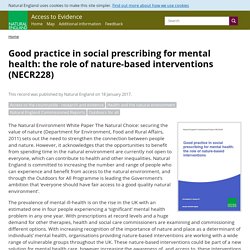
However, it acknowledges that the opportunities to benefit from spending time in the natural environment are currently not open to everyone, which can contribute to health and other inequalities. Natural England is committed to increasing the number and range of people who can experience and benefit from access to the natural environment, and through the Outdoors for All Programme is leading the Government’s ambition that ‘everyone should have fair access to a good quality natural environment’. "Ecoanxiety": the American Psychological Association says climate change is causing PTSD, anxiety, and depression on a mass scale. Climate Change Could Have Wide-Ranging Effects on Mental Health. ATLANTA — Climate change may have surprising and wide-ranging effects on mental health, experts say.
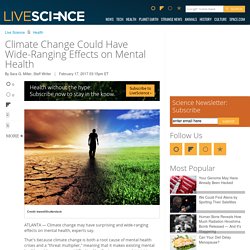
That's because climate change is both a root cause of mental health crises and a "threat multiplier," meaning that it makes existing mental health problems worse, said Dr. Why Climate Change Is Bad For Your Mental Health. Anxiety has become a way of life for my generation. In an insecure world, is it any surprise? It always hits me in the gut first.
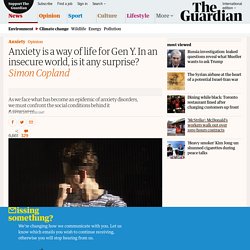
I often feel it first thing, my stomach twisted in a knot, my brain deciding it doesn’t want to deal with the day before I even wake up. Sometimes my anxiety will fester around a particular thing – a cascade of worry about my work, health, social life, or often a simple decision I have to make. This worry becomes totally paralysing, with hours spent focusing on nothing else but this one issue. At other times the anxiety hits for no reason, a desperate feeling of dread that I cannot explain, nor wash away no matter how much I try.
Over the past couple of years I’ve come to terms with the reality of my anxiety disorder – moving from seeing myself as someone who has anxious moments to realising I have a mental health condition. In many ways it has been liberating, largely because in owning the illness I’ve been able to start dealing with it. I’ve managed to understand this by thinking about anxiety as a stressful event. But herein lies the challenge. Is There an Ecological Unconscious? About eight years ago, Glenn Albrecht began receiving frantic calls from residents of the Upper Hunter Valley, a 6,000-square-mile region in southeastern .

For generations the Upper Hunter was known as the “ of the South” — an oasis of alfalfa fields, dairy farms and lush English-style shires on a notoriously hot, parched continent. “The calls were like desperate pleas,” Albrecht, a philosopher and professor of sustainability at Murdoch University in , recalled in June. “They said: ‘Can you help us? We’ve tried everyone else. Is there anything you can do about this?’ Solastalgia-the-painful-result-of-man-s-ongoing-reviling-of-nature-1. In my last column, I described gazing with horror upon a clearcut.
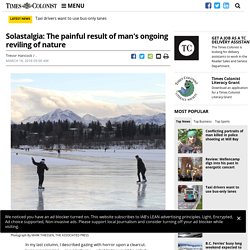
I was experiencing — in a small way — what today would be called “solastalgia”: “The pain or sickness caused by the loss of, or inability to derive solace from, the present state of one’s home environment.” In my case, it was not my home environment, but I can well imagine what the impact would be on people for whom that forest was part of their home environment. The term solastalgia was coined 15 years ago by Glenn Albrecht, an Australian philosopher. "Solastalgia" or the psychic pain of climate change. In 2014, the writer and critic Zadie Smith published an essay in the New York Review of Books that drew a word-map around the perimeter of a feeling for which she felt we lacked language.
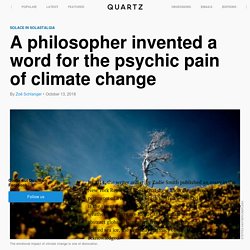
“There is the scientific and ideological language for what is happening to the weather, but there are hardly any intimate words,” she wrote. Amid abstract global temperature trends and unfathomable volumes of melted sea ice, the everyday intimacy of climate change goes under-acknowledged. The feeling Smith wanted to describe was a type of loss—the loss of her home environment in England. That year, historic floods washed over the UK in the wettest winter England and Wales had seen since record keeping began nearly 250 years prior.
Climate change had made extreme rainfall more likely for the region. This Is Life After Nature. Solastalgia is the definitive disease of the 21st century but only a few even know its name.
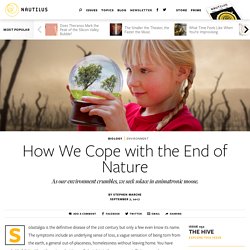
The symptoms include an underlying sense of loss, a vague sensation of being torn from the earth, a general out-of-placeness, homelessness without leaving home. You have probably felt it without knowing what it was. Solastalgia is the unease we inflict on ourselves as we create a world we don’t want to inhabit, a world stripped of nature. Lived experiences of environmental change: Solastalgia, power and place. Climate change leading to 'solastalgia', the feeling you get when your home is wrecked. Opinion By Richard Yin Posted 4 Oct 2018, 9:00pmThu 4 Oct 2018, 9:00pm Place is important to all of us.
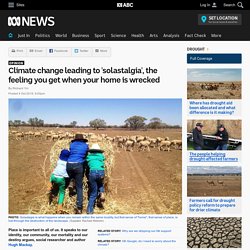
It speaks to our identity, our community, our mortality and our destiny argues, social researcher and author Hugh Mackay.